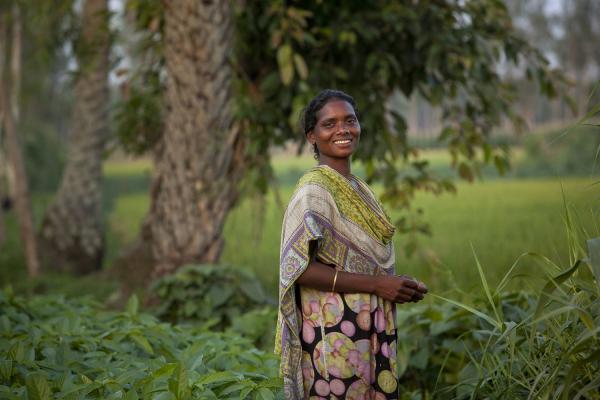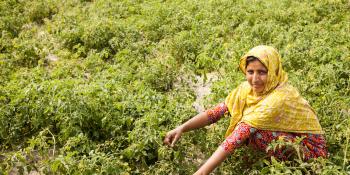The Growing Together programme is making farming more profitable for thousands of small-scale farmers – and making sure that women don’t miss out on the rewards.
28-year-old Selina Kerketa is the secretary of an all-female farmers' group in north west Bangladesh. Working together, group members have seen an increase in their yields and income.
Working together
"Together we are learning in the field and I can apply these lessons to my own field. I’ve learned how to properly plant vegetables, how to measure and apply fertiliser, this was all new for me. Previously I used fertiliser, but I didn’t measure it properly, and some plants died.

"It’s too early to know for sure, but we are sure that we will have a lot of good produce this harvest. In our joint field we can see that there will be good fruit.
"This harvest we will sell in the market as a group. Working together we can get a better price.
"I hope to sell more produce in the future and I’m confident that I can do this.
"I plan to keep the extra money for my children’s education, and for investing in my crops."
Saving together
"We’ve only been a group for one season, and so far we have saved 1500 Taka (£12.36). Each farmer contributes 10 Taka per week, and we have thirty members. We have used it to lease some land from a landowner. We have a plan to lease more land for potato cultivation.
"Our members don’t have other sources of income, so we’ve decided that when our savings increase, we can offer loans to members, to support their children’s education and other purposes."
Last year 90% of farmers participating in Growing Together saw their net income increase by 50% or more.
Challenging inequality
"I don’t have much land, only 0.4 acres, so sometimes I work on other people’s fields. I get paid 200 Taka (£1.65) per day, and the men get 250-300 Taka (£2.06 - £2.48) for the same work. Previously women received even less than this, we used to get 150 Taka (£1.24). A few of us women started saying - if you don’t raise our salary, then we will not work, so they slowly, slowly started raising it. I was part of this."
I felt good when they raised our money.
Equal at home
"My husband and I share decision making. It is good to make decisions together.
"Boys and girls have the same rights so I think they should get the same opportunity for education. I want my children to continue their studies. I hope that they will both complete their education and get jobs. I view my boy and girl as being equal.”
Find out more about our work in:
Bangladesh
We work across all of Bangladesh's 30 districts, building healthy communities, strengthening inclusive education systems, and supporting people to develop secure and resilient livelihoods.

Overcoming rural poverty through farming innovations
The Growing Together programme harnesses our collective expertise in agricultural techniques and value chains to grow smallholder farmer household incomes.
